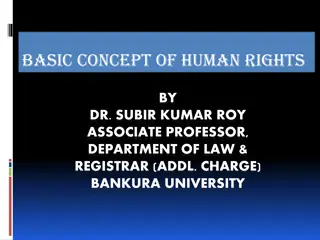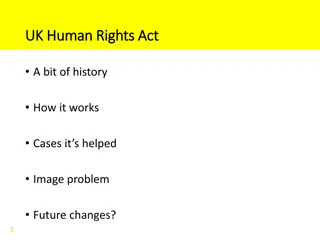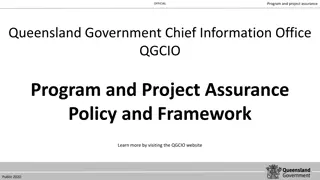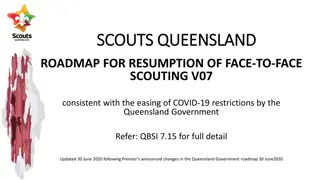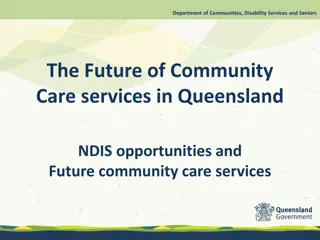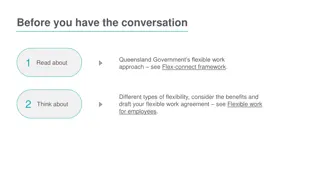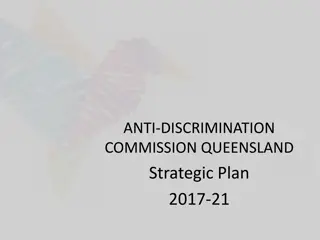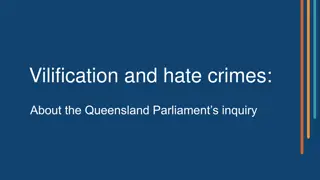Human Rights in Queensland Government Work
The Human Rights Act of 2019 in Queensland outlines protected rights such as equality, freedom of expression, and fair trial. All public service employees must adhere to these rights, ensuring decisions and actions respect human rights. This act applies to everyone in the Queensland Government, with obligations to consider human rights in all work decisions. The decision-making process involves assessing which human rights are impacted by a decision, determining if rights will be limited, and ensuring legality of actions taken. It is essential to uphold human rights in all aspects of work within the Queensland Government.
Download Presentation

Please find below an Image/Link to download the presentation.
The content on the website is provided AS IS for your information and personal use only. It may not be sold, licensed, or shared on other websites without obtaining consent from the author.If you encounter any issues during the download, it is possible that the publisher has removed the file from their server.
You are allowed to download the files provided on this website for personal or commercial use, subject to the condition that they are used lawfully. All files are the property of their respective owners.
The content on the website is provided AS IS for your information and personal use only. It may not be sold, licensed, or shared on other websites without obtaining consent from the author.
E N D
Presentation Transcript
Human Rights Act 2019 An Act to respect, protect and promote human rights Fully operational since 1 January 2020 Obligations on public service employees, departments, agencies, Ministers, police and other organisations doing Queensland Government work
Rights protected under the Act Recognition and equality before the law Right to life Protection from torture and cruel, inhuman or degrading treatment Freedom from forced work Freedom of movement Freedom of thought, conscience, religion and belief Freedom of expression Peaceful assembly and freedom of association Taking part in public life Property rights Privacy and reputation Protection of families and children Cultural rights generally Cultural rights Aboriginal peoples and Torres Strait Islander peoples Right to liberty and security of person Humane treatment when deprived of liberty Fair hearing Rights in criminal proceedings Children in the criminal process Right not to be tried or punished more than once Retrospective criminal laws Right to education Right to health services
Do I have obligations under the Act? All public service employees have obligations under the Human Rights Act 2019 The Act applies to everyone in Queensland Government Human rights are relevant to every position in Queensland Government
When do I have to think about human rights? When you are making a decision in your work When you taking an action in your work When you are recommending a decision or action is taken You need to consider if the decision or action will affect the human rights of people in Queensland
Decision making process to consider human rights 1. What human rights are affected by the decision? 2. Will human rights be limited by the decision? An action or decision limits a human right if it stops a person from enjoying their rights or changes the way a person enjoys their rights. No? You don t need to go through the rest of the steps 3. Is there a law that allows me to take this action? If there is no law or regulation that says you can make this decision, you may not be able to limit human rights.
Decision making process to consider human rights 4. Can I show that there is a good reason for the limitation and that it s fair and reasonable? a) What is the human right trying to protect? b) Why do we need to limit the right? c) What is the purpose of this action, decision, or policy? d) Is there a connection between the limitation and the purpose? Will what I am doing actually achieve what I am trying to do? e) Can I achieve the purpose in a less restrictive way? Is there another option available to me? f) Is there a fair balance between the reason for limiting the right and the importance of protecting the right?
Decision making process to consider human rights 5. Is the decision consistent with human rights law? If you can show that your decision limits rights in a way that is fair and reasonable, then your decision is consistent with human rights law.
What if I dont meet my obligations? Acting or making decisions in a way that is not compatible with human rights is unlawful Most government departments and agencies have embedded respect for human rights into their employee policies with which you are obligated to comply Disciplinary actions can apply to employees not meeting their obligations Individuals can complain if they believe their human rights have been breached
Human rights complaints A person (including internal employees) who believes their human rights have been breached should complain first to the agency/department involved, through their complaints process If the person is not satisfied with the response after 45 business days, the person can complain to the Queensland Human Rights Commission There are also legal options: If the person has another claim going to a court or tribunal, they can attach a human rights claim A person cannot take a human rights claim to a court or tribunal independently of another claim
Key impacts for government departments Policy and legislation development Decision-making and service delivery Complaints handling Reporting
Tools to build a human rights culture Organisation vision, plans, policies and procedures are being updated to promote good human rights practice Human rights capabilities are being built into position descriptions, professional development and performance management systems Human rights are being included in reporting and auditing systems Communicating with the community about their rights and how to make a complaint
Want to know more? Human Rights Portal Visit the Human Rights Portal Queensland Human Rights Commission Read the Queensland Human Rights Commission information Complete your department s online Human Rights Act training Talk to your Manager






